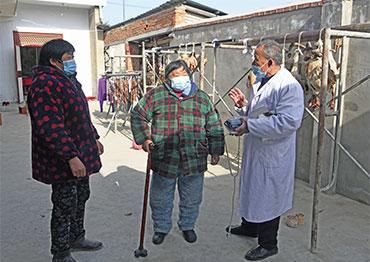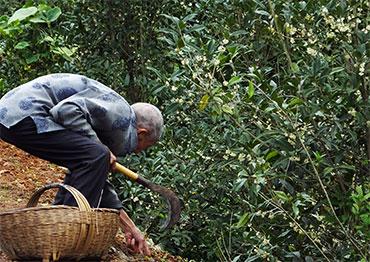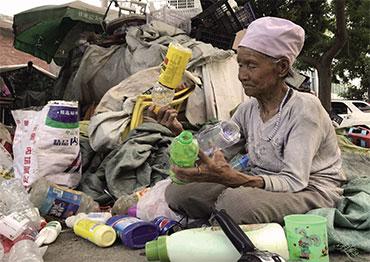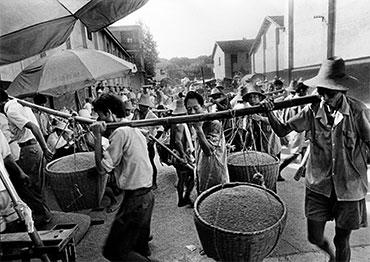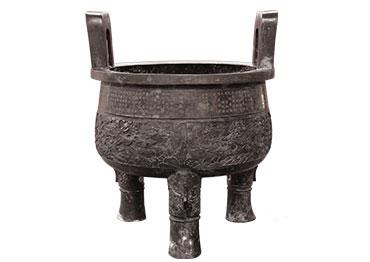Chen Wu, her husband and son all work in Beijing, but her father and mother still live in their village, where they spend around 1,000 yuan (US$143) a month on living expenses, excluding pesticide and fertilizer.
“They just grow some vegetables and have to buy other food and necessities from the store. Although they have some income from land they’ve rented out, it’s not much,” Chen Wu said. She gives money to her parents every month.
Wang Shuna takes care of her mother and father at home. They live a frugal life. Wang Qiuquan refuses to stop working as an electrician and will not accept money from his daughter.
“My parents don’t want to burden me. They’re even saving money for my later years, since I’m divorced and raising my daughter on my own,” Wang Shuna said. “They don’t even want to drink milk every day,” she added.
One 67-year-old worker in Zhangjiakou, Hebei Province told NewsChina that he does not know how much longer he can work. “I get 130 yuan (US$19) in pension every month, and I’m still working in urban areas, but I don’t know how long it’ll last, because I am getting older and weaker and it’s getting increasingly harder for me to find work,” he said.
According to a 2021 survey by the NBS, nearly 80 million people above 50 years old from rural areas worked in cities, 27.3 percent of the total number of rural workers. In a 2022 report about older rural workers by financial portal yicai.com, writer Zhang Zheng from Peking University’s Guanghua School of Management cited a 2017 survey by China Information News, a newspaper under the NBS, as saying that the number of rural people aged 60 and older working in urban areas increased by 2.22 million in 2017 alone.
The Farmers’ Daily also cited a survey by the Chinese Academy of Social Sciences as saying that rural seniors’ incomes mainly rely on labor, renting out their land and transferred assets (like pensions), but the money from renting their land was less than 600 yuan (US$86) per year.
Some analysts argue there are good reasons for the gap in urban and rural pensions – rural dwellers have land and houses and therefore pay no rent, whereas the cost of living in urban centers is increasing rapidly. Urban employers also pay pension contributions for their staff, the biggest portion of the final pension, while the basic part of rural pensions are paid entirely by the government.
But Chen Wu and Wang Shuna both said that elderly farmers like their parents already gave the government a lot of their rice crop before the 2000s, and it is unfair for them to be underpaid in their later years.
To promote industrial development along with agriculture, in 1955 the State set a rice quota for each rural family as a form of tax. The system was not abolished until 2006.
“At the time, the government collected our rice at a very low price, a quarter or a fifth of the market price,” Wang Shuna said.
“I don’t remember the exact price... It was very low, but my parents always gave them their best rice,” Chen Wu said.
Many experts argue that when the rural pension barely covers minimum daily expenses, it fails to fulfill its original purpose of supporting seniors.
“We have to consider raising rural pensions. It’s indeed a lot of money for the government but I think there is room for us to increase the amount annually,” said Bai Yansong, a news anchor for China Central Television and a Chinese People’s Political Consultative Conference (CPPCC) member, during the 2022 two sessions.
“We have to improve the system of regularly adjusting the basic government pension for rural areas,” Zhang Lianqi, an accounting consultant invited by the Ministry of Finance and a CPPCC member, told China News Service during the 2023 two sessions. “Chinese farmers have made enormous contributions to China’s modernization and rural revitalization, and we are able to and should be historically liable to repay them,” he said.
According to Zhang, rural pensions differ between regions. The national average is less than 200 yuan (US$29) a month. In wealthier provinces like Zhejiang, it is between 200-300 yuan (US$29-43). In Beijing, it rose to 887 yuan (US$127) a month this year, while Shanghai’s is even higher at 1,300 yuan (US$186). But as rural expenditure does not differ greatly between regions, it is imperative to increase the basic government pension, especially in undeveloped and impoverished areas.
“Increasing the rural government pension should be a breakthrough for rural reforms... and the increase should be dynamic and based on the annual disposable income of rural residents and the Consumer Price Index,” Zhang said.
Older seniors, generally those over 80 do get an additional 50 yuan (US$7) allowance a month. Zheng Fengtian suggested expanding this policy. “If rural people over 60 get 300 yuan (US$43) a month, those over 70 get 500 yuan (US$71) and those over 80 get 800 yuan (US$114), I believe the Chinese farmers’ satisfaction index would soar,” he told NewsChina.
According to Zheng’s calculations, the government needs to input around 200 billion yuan (US$29b) more every year to raise the nationwide rural monthly pension to 300 yuan (US$43). “I don’t think this number is too large,” he said.
Chen Zongsheng, director of the China Institute of Wealth and Economics, Nankai University in Tianjin, goes even further. “If we truly want to benefit rural people, their pensions should be at least half that of urban employees, around 1,000 yuan (US$143) if the urban average is 2,000 yuan (US$286). This, combined with other income sources like land, would provide much better support for rural seniors,” he said.
The seniors NewsChina interviewed said an ideal pension would be 800- 1,000 yuan (US$114-143), which echoes experts’ suggestions. “If our pension really increases to 800 yuan (US$114) as the experts suggested, I’d be extremely happy,” Chen Xianhong said.
China’s 14th Five-Year Plan (2021- 2025) pledges to gradually increase rural pensions and urban unemployment benefits. Liu Chonglong, a director from China’s Ministry of Human Resources and Social Insurance, told media during the 2023 two sessions that the ministry will raise the pension by increasing the basic payment and improving the returns of individual contributions.
Experts believe these reforms should move faster. “It’s impossible to immediately close the gap between rural and urban pensions, but it is completely possible for us to narrow the gap and properly increase the rural pension. We should take bigger and faster steps,” Chen Zongsheng said.
“My parents often say ‘less is better than nothing,’” Wang Shuna said. “But I think the government should give back to those farmers who contributed so much to the country’s development and are now too old to support themselves,” she said.
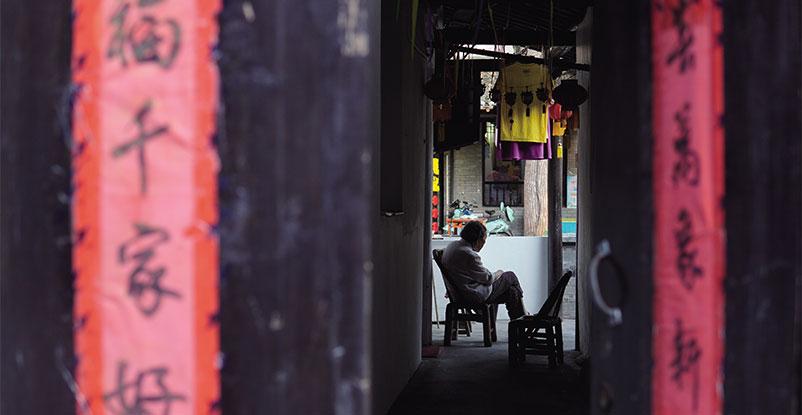
 Old Version
Old Version
